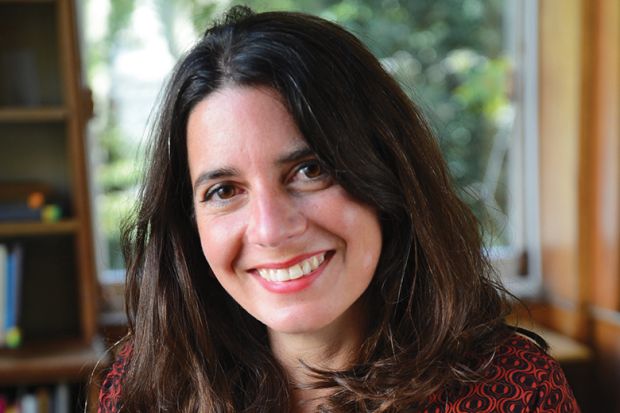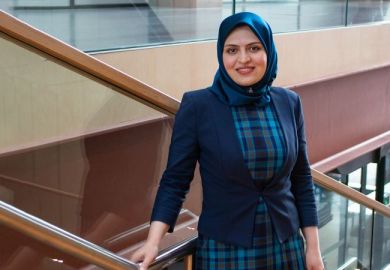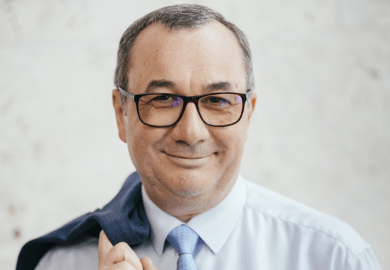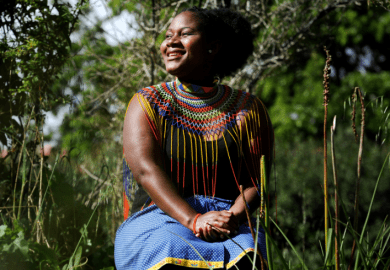Mirjam Brusius is a research fellow in colonial and global history at the German Historical Institute in London. She is an expert in the circulation of objects and images in and between Europe, the Middle East, and Asia – especially ancient artefacts held by museums, how they are passed between institutions and why some remain in storage. She is co-founder of the 100 Histories of 100 Worlds in 1 Object project and earlier this month was announced as a winner of the 2022 Dan David Prize, the largest history prize in the world.
Where and when were you born?
I grew up in the south-west of Germany in a mixed-race family. There weren’t many families like ours. It was the time of the Cold War, but also of regime change and extremely violent conflicts in the Middle East.
How has this shaped who you are?
I suppose this is how one learns to mediate between cultures, as challenging as it can be to sit in between them. I sometimes identify with the kind of museum objects I work on, which are in transit between East and West. They are hard to taxonomise, being seemingly everything and nothing at the same time, which is why museums often do not know what to make of them. That said, there is potential in such a status.
What kind of undergraduate were you?
Curious and erratic, studying across cultural and visual studies as well as musicology, while actually being more interested in politics and social sciences.
What’s your most memorable moment at university?
My first seminar. It took place at an East German university and was on post-1989 regime changes in Eastern Europe. I was from West Germany and shared the space with many students from the East. The wall had only come down 10 years earlier – debates were heated. I understood that we were all implicated in these histories. Nobody was neutral.
What originally sparked your interest in museum objects/images and their journeys around the world?
I first worked on the history of photography on archaeological excavation sites. Cameras were often used because scholars at the time tried to “make sense” of the objects they excavated. I therefore became more interested in the “in-betweenness” of objects, that is, their status before people figured out which categories they might fit in. Many ended up in storage, which is where the majority of museum objects still are today; a questionable fact now as communities are asking for them to be returned.
What do these journeys tell us about the legacy of colonialism?
The history of collecting and archaeology is inextricably linked to imperial expansion, economic extraction, and exploitative labour. The slave trade provided the infrastructure and funding for European exploration; European nations benefit to this day. These unequal power structures live on when museums pursue sponsorship by oil companies that mainly harm the Global South. Europe might now repatriate objects – but it also happily repatriates people as border controls remain tight. As my Egyptian colleague put it, it seems easier to travel to Europe as an ancient mummy than as a modern Egyptian.
Why is it so important to include collaborations with researchers and others in the Global South in your work?
Because we have only told one part of the story. You cannot fill museums with objects from all over the world and uphold the view that there is one single universal narrative that applies to them. The key concern of our project, 100 Histories in 100 Worlds in 1 Object, an antipode to Neil MacGregor’s A History of the World in 100 Objects, is to show that one object has not only one story, but many.
How should universities in the Global North change the way they work with institutions and academics in the Global South?
We urgently need to achieve more equal and sustainable work conditions in research. Doing global and colonial history holistically entails understanding the epistemologies and structures in which we are ourselves embedded. Institutions often replicate colonial exploration. Who gets to travel and is granted a visa? Which knowledge counts? In our project we also think a lot about where we publish, in which format and language, who gets access (not everyone has a stable internet connection), who benefits, and who should take credit. These conversations are necessary to redress the balance of power – and to create spaces for people from the Global South to speak and be listened to.
What outcome from your research are you most proud of?
As a student I often wondered what the point of my studies was. Now I feel that historical research can have a powerful impact on how people see the world. Once people understand what historical continuities are – for instance, how colonialism lives on in racist structures – we can also undo them.
How did it feel to be told you were a winner of the Dan David Prize?
It felt surreal and overwhelming due to the responsibilities that come with such an award.
What is the biggest misconception about your field of study?
The misconception, a belief held up by many historians themselves, that there are histories that are not ideological. Yet all histories are. There is also a misconception that history lies in the past. Yet as an exhibition in Birmingham on the British Empire put it so aptly a few years ago: the past is now.
Do you live by any motto or philosophy?
I heard someone say we must unlearn everything we know in order to find true innovation. While I think this is a challenge, I like to try and see things upside down; understand where “the other side” might be coming from.
If you weren’t an academic, what do you think you’d be doing?
Perhaps I’d be an (inattentive) psychologist, an (unsuccessful) theatre director, or a (scattered) investigative journalist abroad. Ideally, all these professions create narratives that make people understand their own place in the world. But I can also do just that as a historian.
CV
2002-2007 MA in art history, cultural studies and musicology, Humboldt University of Berlin
2007-2011 PhD in history and philosophy of science, University of Cambridge
2011 DAAD fellow, Humboldt University of Berlin
2012-2013 Postdoctoral fellow, Max Planck Institute for the History of Science
2013-2014 Postdoctoral fellow, Mahindra Humanities Center, Harvard University
2014-2017 A. W. Mellon postdoctoral fellow, University of Oxford
2016 Aby Warburg Prize for Early Career Researchers
2017- Research fellow in colonial and global history, German Historical Institute London
2018 Maurice Daumas Prize of the International Committee for the History of Technology
2022 Dan David Prize
Appointments
Aleks Subic has been appointed Aston University’s new vice-chancellor. He joins in August from RMIT University in Australia where he was the deputy vice-chancellor (STEM) and vice-president (digital innovation). At Aston he will succeed Alec Cameron, who recently joined RMIT as vice-chancellor. Professor Subic said he felt “privileged” to be given the opportunity to lead the university and wants to “continue to build on its reputation for high-quality teaching, research and business engagement locally, nationally and internationally.”
Rajani Naidoo has been named the University of Bath’s new vice-president (community and inclusion). She is stepping up into the new role from her current position as director of the International Centre for Higher Education Management. The post involves leading on the university’s equality, diversity and inclusion strategy as well as student well-being. Bath’s vice-chancellor Ian White said Professor Naidoo brings a “hugely impressive track record” to the role and has already made “significant contributions to our university”.
Werner van der Merwe will be Swinburne University of Technology’s first vice-president for innovation and enterprise. He is currently executive manager, commercialisation at the Commonwealth Scientific and Industrial Research Organisation.
André Spicer has been named dean of Bayes Business School at City, University of London, having served as interim dean since December 2021. He was previously head of the school’s Faculty of Management.
Lisa Williams is joining Leeds Trinity University as director of global engagement. She is moving from education technology platform Adventus, where she was partnerships director for UK and Europe.
The University of Adelaide’s Business School has appointed Gary Bowman its new MBA director. He joins from Bond University where he was MBA director and associate professor of global strategy.
Nigel Ward will be the new head of the School for Film, Media and Performing Arts at the University for the Creative Arts. He is currently head of music and performing arts at Anglia Ruskin University.
Register to continue
Why register?
- Registration is free and only takes a moment
- Once registered, you can read 3 articles a month
- Sign up for our newsletter
Subscribe
Or subscribe for unlimited access to:
- Unlimited access to news, views, insights & reviews
- Digital editions
- Digital access to THE’s university and college rankings analysis
Already registered or a current subscriber?




